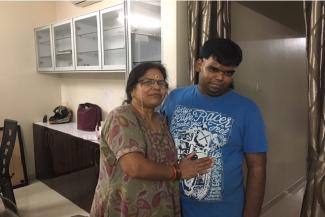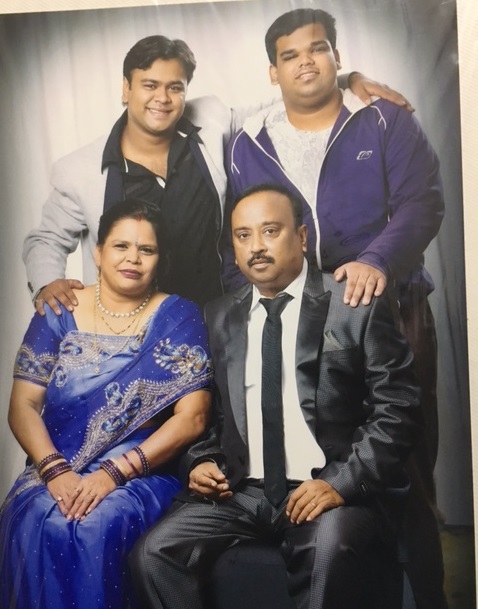
It can be formidable task to raise a child with either autism or schizophrenia. But when the two come together, the challenge escalates. Deepak Srivastava, recounts how his wife grapples with his 22-year-old son, Soumitra’s impulsive aggression.
Our second son, Soumitra, was born autistic. We did not realize it initially; it was only when his growth milestones like walking or talking were not being met that we sensed something wrong. His behaviour pattern too was odd. He would stare awkwardly at the fan spinning or curtains flapping for hours.
After showing him to a few doctors in Pune, he was referred to Dr Vrajesh Udani, a neurologist at Hinduja Hospital, Mumbai. Some general check-ups and tests revealed that our son was autistic. The Doctor asked us point blank: “Do you know what autism means?” My wife and I looked at him blankly, because we had never heard the word before.
Since then ‘Autism’ has become a part of our lives and conscious. We, especially, my wife Anita, began to read and learn about the disorder painstakingly. We began to realise that Soumitra was different from other kids; yet, deep down, we still clung to an elusive hope. We tried sending him to a mainstream school, but his erratic behaviour did not allow him to sit still. We then decided on home learning for him.
The worst phase started after Soumitra reached puberty. Along with autism, he also began to show symptoms of schizophrenia. His compulsive, repetitive behaviour became more pronounced; his mood swings increased. But, what really became a challenge for us were his bouts of hallucination and hostility. Around the age of 13-14, we noticed that his anger and anxiety triggers had become frequent. His obsession with routine became hard to handle. If his routine in the morning was to brush, bathe, breakfast and have medicines in that order, and if the sequence got upset on a particular day, it would agitate him to the point of violence. He would toss things around and physically attack the staff at home.
Anita and I decided to get touch Ms Sunita Lele, a special educator and therapist in Pune, who had worked closely with parents of children with autism. We got him admitted into the day school under her care. He put up a lot of resistance to go to school, but Anita would sit with him patiently all day. Sometimes, I would feel that Anita had still not reconciled to the fact that our son was autistic and schizophrenic and nursed a deep hope that he would be alright one day. I remember the therapist telling me once that I need to counsel you wife more than I need to work on your son.
By 18, Soumitra had grown into a tall, heavy-built boy. Although Ms Lele’s school had disciplined him considerably, his obsession for routine and his aggression became more severe. He had begun to attack Anita now. There were many occasions when I would find her bruised or bleeding. Although Anita had read and been counselled extensively on how to raise and handle children with special needs, there would be moments when Soumitra would get angry uncontrollably. On such occasions, he would hurl himself at his mother, bite, beat, and scratch. We would need two people to wrench him away from her. It is horrible to see Soumitra attack his mother. But my wife endures all silently, uncomplainingly. We can put him in an institutionalized set up, but Anita is totally against it.
Recently, when we wanted to shift to a bigger house, it took us four months to convince Soumitra. We had to break the news very gently to him, otherwise he would break into a fit and get violent. He is averse to change. I remember when we replaced our old dining table and bought a new one, Soumitra began kicking and screaming and almost broke one of the chairs. But Anita and I are slowly learning to handle his temper tantrums by adhering to his way of functioning. If we have to go to a restaurant now, we tell him a week in advance and keep repeating it every day, so that he registers. It takes a while for him to process information. He is then disciplined and well behaved, otherwise he can raise hell. Like we cannot go for movies with him; I don’t remember the last time, I went to a cinema hall.
Somewhere in our journey, we came across Mr Amrit Bakhshy, a courageous and helpful man, whose daughter has schizophrenia. He is the President of Schizophrenia Awareness Organisation. He counselled us and gave many insights about schizophrenia. On his recommendation, we enrolled Soumitra at Schizophrenia Awareness Association, a day care activity centre for people with schizophrenia. Soumitra looks happy there. He likes their activities. There is yoga, music, dance, cooking, exercises, drawing and painting sessions, computer skill learning, activities with Rubik’s cube, art and craft, making paper bags, etc. He is kept busy at the centre all day. His anger related issues have also reduced.
Soumitra will be 22-years-old this September. It is good to see him smile and be happy now. That’s all my wife and I pray for our son.







